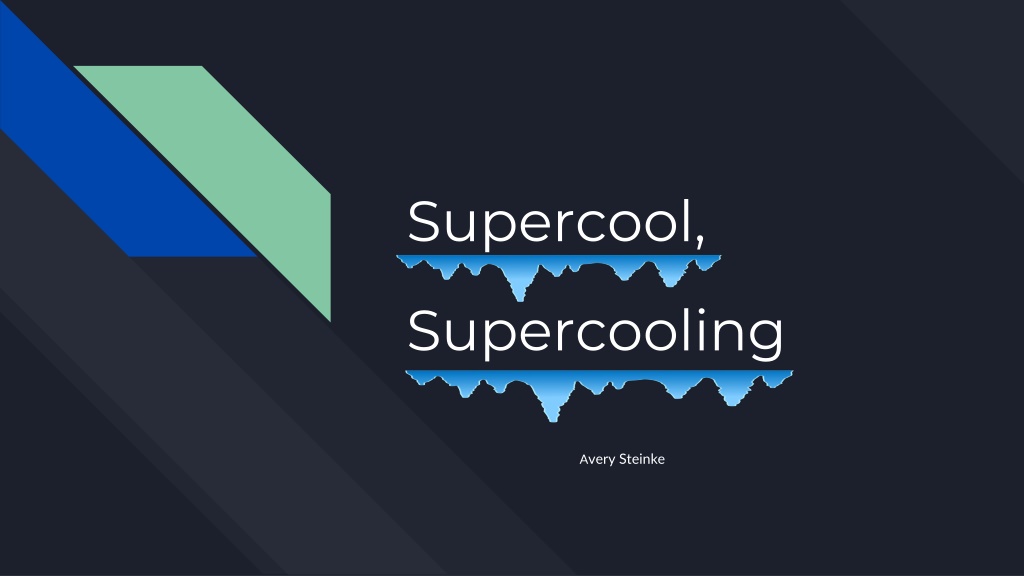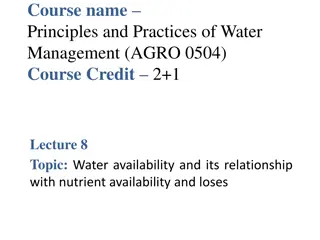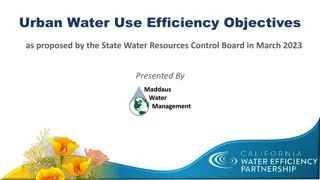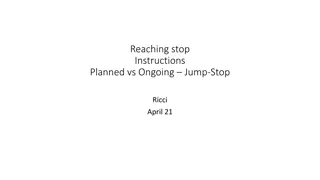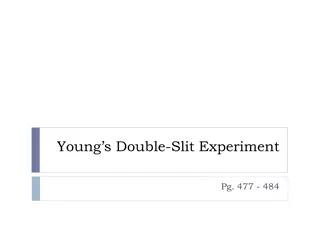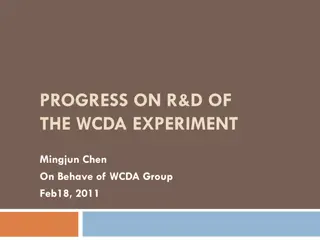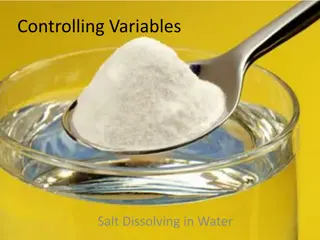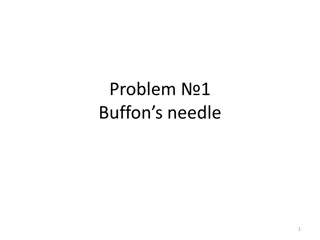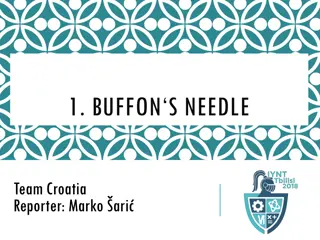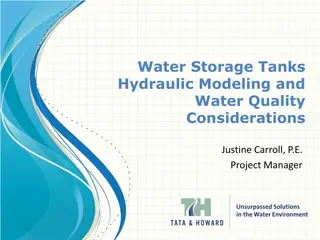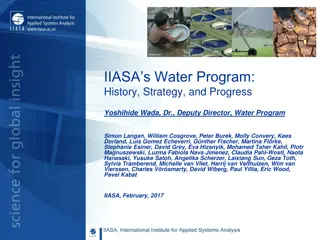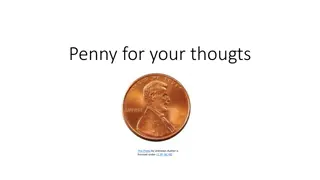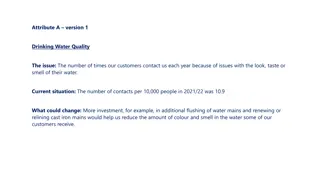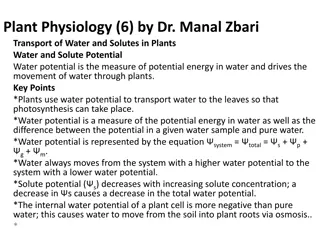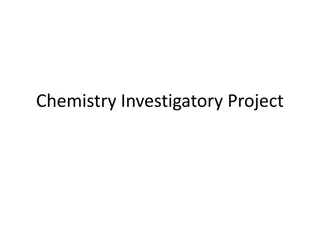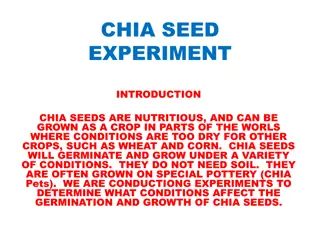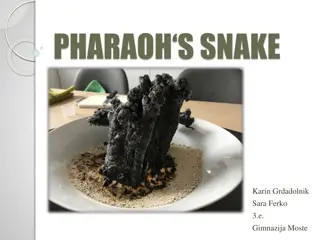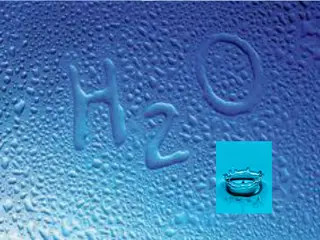Supercooling Different Types of Water Experiment
This experiment explores the process of supercooling different types of water to understand which type can maintain a liquid state below zero degrees Celsius. The procedure involves cooling the water below its freezing point without it solidifying, aided by adding ice and monitoring temperatures. The hypothesis suggests distilled water may remain in liquid form due to the absence of nuclei for crystallization. Snap freezing and the impact of impurities on freezing are also discussed in the background research.
Download Presentation

Please find below an Image/Link to download the presentation.
The content on the website is provided AS IS for your information and personal use only. It may not be sold, licensed, or shared on other websites without obtaining consent from the author.If you encounter any issues during the download, it is possible that the publisher has removed the file from their server.
You are allowed to download the files provided on this website for personal or commercial use, subject to the condition that they are used lawfully. All files are the property of their respective owners.
The content on the website is provided AS IS for your information and personal use only. It may not be sold, licensed, or shared on other websites without obtaining consent from the author.
E N D
Presentation Transcript
Supercool, Supercooling Avery Steinke
Testable Question Can you Supercool all types of water? Why or Why not?
Hypothesis If a person supercools different types of water then distilled water will be the only one to maintain liquid form below zero degrees celsius because there is not a nucleus for crystallization.
Background Research What is supercooling? Supercooling is the process of cooling a liquid below its freezing point, which in this case is water so we are going to cool water below 0 degrees, without it becoming a solid. A liquid below its freezing point will make crystals/become clear and real in the presence of a seed crystal or center (of a cell or atom) around which a crystal structure can form.
Background Research Now why does supercooling happen? Supercooling happens because when the water/liquid cools below its freezing point it freezes but if it has no impurities the atoms will have nothing to grab onto so it will not freeze but the second the water has an impurity like dirt or if it gets shaken it will instantly freeze.Now what is snap freezing? Snap freezing is when supercooled water has an impurity so it freezes before you can snap.
Procedure 1. Gather materials 2. Cut a circle from the cardboard to use as a cover for the plastic cup. 3. Pour a small amount of chosen water into a clean plastic cup (enough to fill about 1/4 of the cup) and place the cup in the center of the bowl. 4. Cover the cup, then add ice cubes to the bowl, so that the ice is about 2 3 times higher than the level of water in the cup. Be careful not to get any ice inside the cup.
Procedure 5. Sprinkle two tablespoons of salt over the ice cubes. Be careful not to get any salt inside the cup. 6. Uncover the cup and put the thermometer inside. 7. Monitor the temperature of the water. Over the next 30 minutes or so, you should see the temperature slowly decrease. Keep track of the time and temperature in a spreadsheet. 8. When the temperature of the water reaches 1 to 3 C or so, carefully remove the cup from the ice bath. 9. Record observations of water state.
Procedure 10. Repeat the procedure, testing different types of water to see whether it can be supercooled before freezing. For each type of water, run at least three trials (more is better). Test the following types of water: a. bottled distilled water b. bottled spring water c. plain tap water d. boiled and cooled tap water
Variables Manipulated variable: type of water Controlled variables: cooling method amount of salt used in cooling bath amount of ice used in cooling bath amount of water used in cooling bath same thermometer used for testing container used for cooling bath container used for each of the water types amount of water in small container for supercooling Responding variable: temperature of water when crystallization occurs
Materials Large bowl Ice Salt Distilled water Tap water Kettle Thermometer. A good range would be -20 C to 110 C, Transparent plastic cups (tip: a tall, narrow shape works best) Piece of cardboard (e.g., empty cereal box) Scissors
TAP WATER DISTILLED WATER SPRING WATER BOILED TAP WATER Observation s Time (Mins.) Observation s water water water water water water water water water water water water water water water water Time (Mins.) Observation s water water water water water water water water water water water water water water water water Time (Mins.) Observation s water water water water water water water water water slush frozen frozen frozen frozen frozen frozen Observations 19.7 water 13.6 water 11.5 water 9.6 water 7.6 water 6.1 water 4.6 water 3.3 water 2.4 water 2.4 water 2.0 water 2.0 water 2.0 water 2.0 water 1.7 water 1.7 water Time (Mins.) Temp ( C) Temp ( C) Temp ( C) Temp ( C) 0 2 4 6 8 0 2 4 6 8 19.1 7.0 3.2 2.8 2.5 2.5 2.5 1.6 1.2 0.2 -0.4 -1.2 -1.2 -2.1 -2.1 -2.9 0 2 4 6 8 18.9 13.8 11.3 9.7 8.1 6.1 4.6 2.3 1.7 1.2 1.2 1.2 1.2 1.2 0.7 0.1 0 2 4 6 8 19.6 3.0 1.6 1.2 1.2 1.2 1.2 1.2 1.2 0.6 0.6 0.1 0.1 0.1 -0.1 -0.1 10 12 14 16 18 20 22 24 26 28 30 10 12 14 16 18 20 22 24 26 28 30 10 12 14 16 18 20 22 24 26 28 30 10 12 14 16 18 20 22 24 26 28 30 32 1.3 water 32 32 -0.5 water 32 -0.1 frozen 34 0.3 slush 34 34 -1.1 water 34 -0.1 frozen 36 -0.7 ice 36 36 -1.8 water 36 -0.1 frozen 38 -1.1 ice 38 38 -2.4 water 38 -0.1 frozen 40 40 40 -2.7 water 40 -0.1 frozen
Observations Tap water froze at 34th minute at zero degrees Boiled tap water froze at the 18th minute just before hitting zero degrees Distilled water never froze Spring water never froze.
Analysis It can be inferred that spring and distilled water can be supercooled because of the absence of a nucleus.
Conclusion My hypothesis was partially correct. The distilled water supercooled as expected but spring water also supercooled and that was unexpected.
Sources of Error A change that I should make next time is using water directly from a spring instead of bottled spring water as one of my manipulated variables. This is because the bottled spring water still goes through a minor distillation process.
Application 1. Climate Change 2. Animal Hibernation 3. Planet Exploration Most Exciting Organ Transplant
Bibliography Science Buddies Staff. (2020, November 20). Supercooling Water and Snap Freezing. Retrieved from https://www.sciencebuddies.org/science-fair-projects/project-ideas/Phys_p033/physics/supercooling-water-and-snap-freezing Wikipedia contributors. (2021, January 15). Supercooling. In Wikipedia, The Free Encyclopedia. Retrieved 19:06, January 22, 2021, from https://en.wikipedia.org/w/index.php?title=Supercooling&oldid=100047663 Maggie Romuld. (2016, December 21). Cryoproteins and Supercooling: How Some Animals Survive Bitter Winter Temperatures. Retrieved from http://thescienceexplorer.com/nature/cryoproteins-and-supercooling-how-some-animals-survive-bitter-winter- temperatures DOE/Pacific Northwest National Labratory. (2020, September 17). Supercooled Water is a Stable Liquid, Scientists Show For the First Time. Retrieved from https://www.sciencedaily.com/releases/2020/09/200917180419.htm Canadian Beverage Association. Retrieved 11:28, March 6, 2021, from https://www.canadianbeverage.ca/beverages/water/
